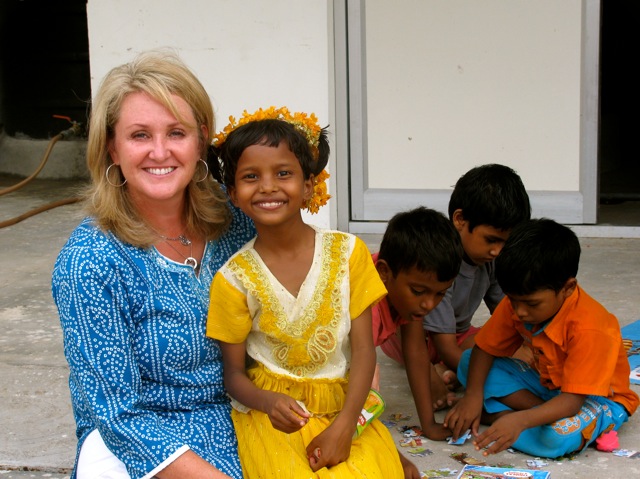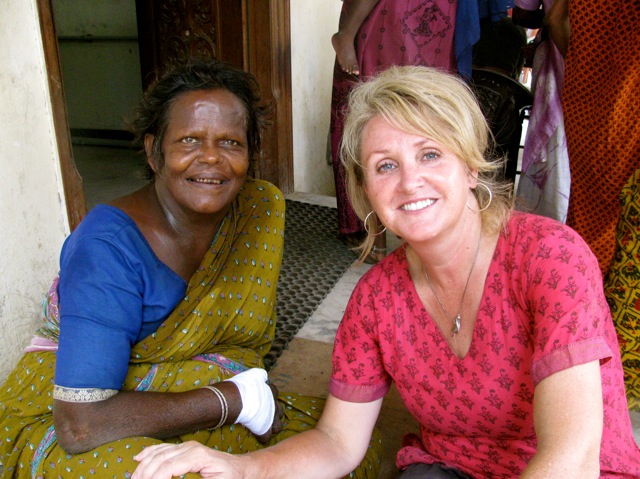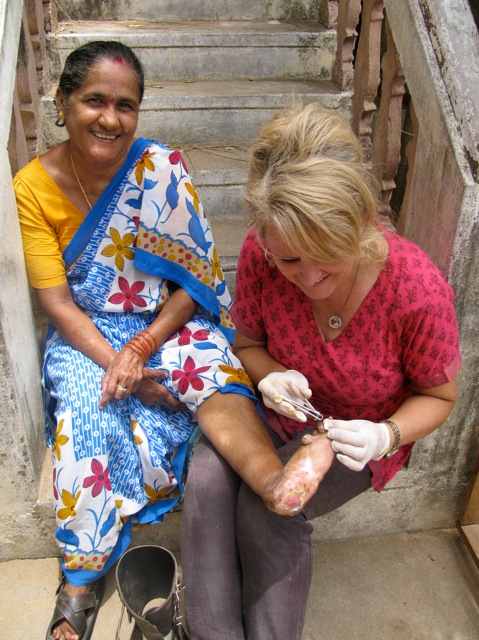January 27, 2010, New Canaan, CT
The mother four teenage children, Sally Read currently serves on the board of Rising Star Outreach, an organization whose mission is to help leprosy colonies in India become self-sufficient communities. Sally discusses the affect of global and local service on her children and how families everywhere can contribute to changing another person’s life.
I’ve always been drawn to causes, to service, to being involved in something. When I was younger I always thought you had to do the “big” things. The bigger the better. I wanted to go Africa. I wanted to go to India. I wanted to go to Cambodia and help the refugees. I’ve always had that in my framework. In high school, I played the piano at a rest home. At college, I did the same thing.
After my husband and I got married we did help with the Cambodian refugees, helping them get set up in Utah. I was teaching school, working on my masters degree at the University of Utah, and I couldn’t have children. So I was drawn to being involved in different causes. We even talked to our stake president at one point and told him we’d like to go on a mission as a couple. He suggested we continue pursuing having children and we understood that, but we didn’t have our first child until I was 29 and we’d been married for eight years.
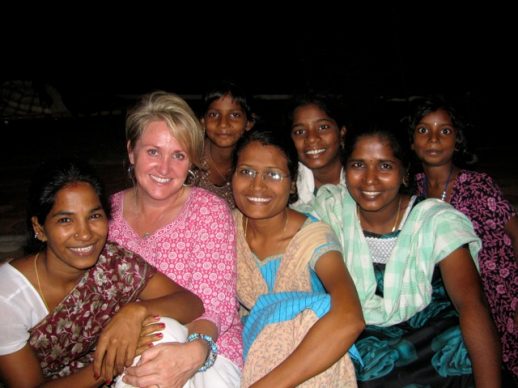
At this time you were both young and your husband wasn’t advanced in his career. Was it hard for you to find things to get involved in that didn’t require large sums of money?
No, not at all. We moved to New York and I would work in the homeless shelters. Then I would hold babies who were addicted to crack at Saint Luke’s Hospital. And of course, I got involved at church. When I had children, I realized I didn’t have to do “the bigger the better” sorts of things. I didn’t have to serve in a foreign country. The best thing I could do was to serve in my communities, in my schools, in my church.
Do you think members of the Church participate enough in local and global service outside of the Church?
I think they do! I think that a lot of us are involved, and we’re more involved more than we think we are. Especially in schools. Don’t you think there are many of us who are involved in our children’s schools? I know we have this perception that we’re engrossed in our church work, but as I’ve lived different places I’ve always seen Mormon women involved in different causes. We take our youth to homeless shelters. Mothers serve as room mothers. That’s being involved. Or, we help with the Teacher Appreciation Day or in the neighborhood.
My family helps the food bank in our town. We’ve gone down to serve meals at the Stamford, CT homeless shelter, the Norwalk, CT shelter… There are always little things that families can do. It doesn’t need to be this daunting, overwhelming thing to solve the world’s problems today.
What advice would you give to a woman who wants to expand her reach from local community service to service at a global level?
I would use your children as a springboard. Use them as a catalyst to get your family doing something. Here we have Haiti right in front of us: What can we do? How do we help someone in Haiti? Well, we can always give more tithing and Humanitarian Aid fund money, but how do you involve your children in that? This sounds so elementary but in our family we’ve set a jar on our counter, and whenever there’s a crisis — we started with the tsunami in December of 2003 — we put our loose change in that jar. I have teenagers so any friends that come by are welcome to put in their change as well. We give that money we collect in that jar to the Church’s Humanitarian Aid fund or to a special cause we’re interested in supporting. We’ve also used that change to help fund a family trip to India with Rising Star Outreach. Of course, we don’t raise a lot but it gets our children aware of what’s going on in the world and gives them a sense of participating.
As the children have grown older, we’ve taken the service to a different level. As a family, we’ve always loved to travel. We have the means to travel, so the kind of family service we’ve done doesn’t work for everyone. We went to Tanzania with our children and worked in a school and took school supplies. We took school supplies with us to South Africa too. My daughter Abby and I have gone to Taiwan and worked in orphanages there. We’ve taken her friends with us to Taiwan on several occasions. Now my family is involved with Rising Star Outreach and the majority of our service is through that organization.
How do you settle on Rising Star Outreach as the organization you most wanted to be involved with?
My daughter was the catalyst for our looking into an organization in India. We had already gone to the orphanages in Taiwan, and when she was a junior in high school she said, “I really want to do something this summer in India with my friends.” So I started researching opportunities on the Web that would accommodate a large group of teenagers. I found a lot of good organizations, but Rising Star Outreach was able to accommodate twelve of us as a group. Rising Star Outreach has three main goals: to educate the children of leprosy-affected parents in one of our beautiful campuses, to provide leprosy patients with micro-finance loans, and to assist in basic medical duties in the leprosy colonies.
That first trip to India was such a great experience for us that when we came back and talked about it, people said to me, “I’d like to do that with my children!” So last summer I organized a second group and this time we took 40 volunteers.
How has this type of service affected you and your children?
It’s always emotional watching your children serve. They rise to the occasion. Some parents have said to me, “Oh I don’t know if my daughter or son can do this.” But you know, kids get in these difficult situations in leprosy colonies where people don’t have hands or feet or their digits are missing or they might have a wound and it’s pretty deep and puss or maggots are coming out of it…. And you know, you watch your children take the bandages off and wash their hands and feet, and it gives you an appreciation for your children. They can’t communicate with the leprosy patients cause they can’t speak the same language but they do speak the language of love.
I’ve seen it make them aware that they really have a lot of advantages in the world. They work a little harder in school. They are kinder. When a cause such as Haiti comes up, they’re the first to ask, “What can we do?” They’re aware of the world around them.
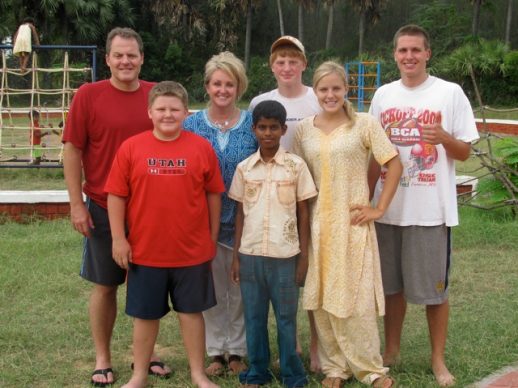
All the parents I’ve taken with me, as they watch their children do these things, they appreciate their children on a different level. The day-to-day teenage years can be tough on kids! And yet when you get them in a different environment where children have nothing…. I mean, some of these colonies have deplorable conditions and they have nothing materially, but the children don’t need much. They’re happy. They’re happy to be in school. It makes your children appreciate those things too.
Would you tell us more about leprosy and your work in the colonies in India? Isn’t leprosy highly contagious?
It has the perception of being highly contagious, but actually only a very small percentage of people have a certain gene that makes them susceptible to leprosy. This genetic component means that the general population is naturally immune to leprosy.
The great problem with leprosy is that when a person contracts the disease, they are ostracized and sent to live in a colony with other people who have leprosy. They’re shunned, outcast, they’re the untouchables. So then they go live in pretty horrible conditions. Then they’re even more susceptible to infection and disease. People who have leprosy can’t feel — they can’t feel their fingertips for instance and so when they get burned the burn goes untreated and gets infected. And then it exacerbates the problem. As volunteers, we’re always very careful — we wear rubber gloves, we only use soap on one patient and then discard it — but no, there’s little chance that a volunteer will catch the disease.
Is there a vaccine for leprosy?
There is an antibiotic for leprosy that costs about a dollar a day. It can’t be cured in its advanced stages, but the antibiotic can stop the progression of the leprosy if caught in time. But Indian culture is a huge part of the continued existence of leprosy: In their culture, if you have leprosy, the gods gave that to you. It is your karma, and you should live with that. If you live with it, then in the next life you may come back to a better situation. But if you try to cure it or get better, then that’s playing with your karma and it might affect the next life.
You find people rejecting treatment because of that belief?
Yes. The elderly have that idea. But the patients about 45 and younger are starting to say, “We don’t need to live with this. We can be cured.”
What Rising Star Outreach does is take the children out of the colonies and place them in a boarding school we’ve built. It’s away from their families in the colonies but it’s a beautiful campus. The one option that can help them get out of the colonies is education. Isn’t that something! Education. They’re no longer caught up in these cultural traditions that keep the older generations trapped. They can speak good English. They can get computer skills. They’re educated, so they don’t have to be beggars on the street. They can rise above that.
If the colony is the only thing the children know, then they will grow up to be beggars. But if you educate them…. And these kids are so happy to be in school, you can’t believe it. They’re so grateful, even though it’s difficult for them to be away from their families. They’re not orphans. They have families who love them. But they are so grateful to be educated.
So when you take youth over there to volunteer and they see how happy these kids are to learn English, they come home and think, “Wow, I’d better take advantage of what I get to learn at school!” Now of course that doesn’t always translate into our day-to-day lives, we all know that! Only in a perfect world, right?
When encouraging your children to serve, either locally or globally, attitude is very important. You have to approach it with a real love and a genuine desire to be involved with someone else’s life. You never want your child to feel you’re comparing them to kids who are happy with nothing. You can’t force gratitude. You’ve given your child a different experience so you can’t expect them to appreciate things if they’ve never gone without.
But you can teach all the lessons of service locally. As I tell every volunteer, you don’t have to go out of the country to do service. Be kind in the lunch room. Open the door for someone. There are little things everyday you can do. And kids do it.
As parents, we can read the newspaper to young children. Point out children in the news. “Look at these children. They’re being adopted from Haiti. Isn’t this wonderful?” In the newspaper there is always something a child can understand, even if it’s just through a photo. There are books you can read to them. There’s now a picture book of Greg Mortensen’s Three Cups of Tea. Think of what he’s doing, Greg Mortensen. He’s empowering women and girls. A child can learn about that.
Is Rising Star’s goal to abolish leprosy?
No, there are certainly health organizations that work on that, but the main thing we do is educate the children, to provide a team of workers that can assist in medical duties like changing bandages and caring for the wounds. Our teams try to help the people in the colonies learn how to care for themselves. I don’t want to say they teach them to have cleaner living conditions, because sometimes that’s difficult, but we teach them how to care for themselves in the conditions that they have.
Rising Star also manages micro-loans which are amazing things. Small loans empower female business owners and help the colonist have a way to be self sufficient. And if you can be self sufficient… The stories are astounding of what self-sufficiency does for self esteem. It emotionally heals those wounds in the heart of rejection, of displacement, of being an outcast for so many generations. Because if your grandmother has leprosy, your mother is in the colony, you’re in there… it’s families. The whole family is condemned to this life, considered outcast.
Can people help here? Yes! You can sponsor a child and become their pen pal. Or you can loan $25 so someone in a colony can buy three chickens. You know that little jar sitting on your counter I talked about earlier? You can easily gather up your change over a year and say, “Ok, we’re going to help this family start a business raising chickens and selling the eggs.”
Are the colonies like little towns? People have businesses?
Yes, some colonies grow their own food and have businesses. But for many, that’s difficult to do since they’re so totally handicapped. The government helps but not enough of course. Church organizations help too. There are 700 colonies in India alone. About that many in Brazil. It’s more prevalent than we think. We think it’s a Biblical disease but it’s not. It’s still out there. Medical organizations are trying to eradicate it with simple drugs and we’re helping through education, but it’s a cultural thing too.
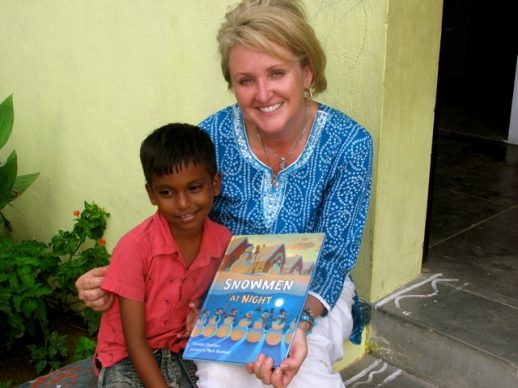
Involve your kids in a discussion of leprosy. Read the Bible and let them know it’s still out there. You don’t have to always give money to be involved. Educating your own child, getting information, is helping. You’re not teaching a child for a day, you’re teaching them for a lifetime and you want them to explore things that are interesting to them. Show them where to start. We have some volunteers that take their creative skills to our colonies. We have dance and music volunteers. You may think, “How does dance help?” It makes the people living there joyful! Volunteers don’t have to just teach reading and writing. All our volunteers bring their strengths.
At the end of the day, the Savior wants us to love much and do what we can. When it comes to service, women especially have to brush the guilt off. We just love much and do what we can. Involve your kids in what you can do. It doesn’t have to be an overwhelming project. It can be singing songs at a rest home. Going to an elderly neighbor. I don’t ever want women to feel that it has to be overwhelming, because then it’s just another thing we don’t do. Starting is always the hard part.
We also have to be aware that there are different seasons in our life and each season allows us to do different things. I have a nephew who is in Haiti right now. He works in Provo and he has a friend who has access to a helicopter. They just packed up the helicopter with rice, beans, blankets and they’re literally just distributing them. Now that is a big thing! But he’s able to do that: he doesn’t have children, he has a flexible job… He’s in a season of his life that allows him to do that. For the rest of us, maybe we just give a little more in our fast offering this month, or buy the blankets that some one else takes.
I love the statement by Anne Morrow Lindbergh: “My life cannot implement in action the demands of all the people to whom my heart responds.” Your heart responds to all these things and you think, “We’ve got to help here and we’ve got to help there…” You don’t have to do it all. All we have to do is love much and do what we can.
At A Glance
Sally Gardner Read
 Location: New Canaan, CT
Location: New Canaan, CT
Age: 49
Marital status: Married 29 years
Children: Four children (20, 18, 15, and 11)
Occupation: Homemaker
Schools Attended: BS from Brigham Young University, M.Ed. from University of Utah
Languages Spoken at Home: English
Favorite Hymn: “I Know That My Redeemer Lives”
Current Church Calling: One of the only true and living callings in the church–Nursery!
On the Web: www.risingstaroutreach.org
Interview by Neylan McBaine. Photos used with permission.
At A Glance

